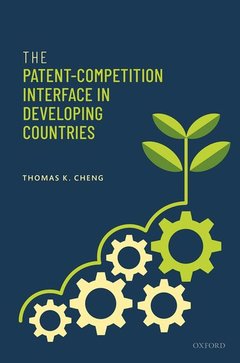Description
The Patent-Competition Interface in Developing Countries
Author: Cheng Thomas K.
Language: English
Subject for The Patent-Competition Interface in Developing Countries:
Publication date: 12-2021
544 p. · 16.5x24 cm · Hardback
544 p. · 16.5x24 cm · Hardback
Description
/li>Biography
/li>
This book proposes an approach to the patent-competition interface for developing countries. It puts forward a theoretical framework after canvassing relevant policy considerations and examines the many reasons why patent protection is not essential for generating innovation incentives in developing countries. These include the tendency of the patent system to overcompensate innovators, the availability of other appropriation mechanisms for innovators to monetize their innovations, and the lack of appropriate technological capacity in many developing countries to take advantage of the incentives generated by the patent system. It also argues that developing countries with a small population need not pay heed to the impact of their patent system on the incentives of foreign innovators. It then proposes a classification of developing countries into production countries, technology adaptation countries, and proto-innovation countries and argues that dynamic efficiency considerations take on different meanings for developing countries depending on their technological capacities. For the vast majority of developing countries bereft of meaningful innovation capacity, foreign technology transfer is the main vehicle for technological progress. The chief dynamic policy consideration for these countries is hence incentives for technology transfer instead of innovation incentives. There are three main means of voluntary technology transfer: importation of technological goods, foreign direct investment, and technology licensing. Competition law regulation of patent exploitation practices interacts with these three means of technology transfer in different ways and an appropriate approach to the patent-competition interface for these countries needs to take these into account. Distilling all these considerations, the book proposes a development stage-specific approach to the patent-competition interface for developing countries. The approach is then applied to a number of patent exploitation practices, including unilateral refusal to deal, patent tying, excessive pricing for pharmaceuticals, reverse payment settlements, and restrictive licensing practices.
Thomas Cheng is an associate professor at the University of Hong Kong. He has written extensively on competition law in developing countries and on the competition law of a number of Asian jurisdictions, including Hong Kong, China, and Japan. His research has appeared in respected specialist U.S. journals, including Chicago Journal of International Law, Berkeley Business Law Journal, Virginia Law & Business Review, and University of Pennsylvania Journal of Business Law, and in leading competition law journals such as Journal of Antitrust Enforcement and World Competition. In 2020, he published Competition Law in Developing Countries, with Oxford University Press.
© 2024 LAVOISIER S.A.S.

